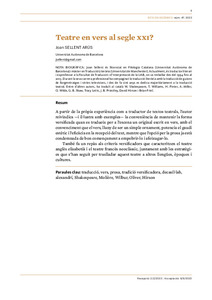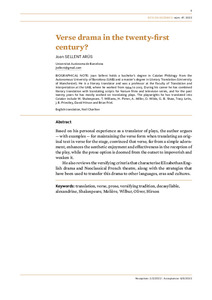| dc.contributor.author | Sellent Arús, Joan | |
| dc.date.accessioned | 2022-12-31T12:59:49Z | |
| dc.date.available | 2022-12-31T12:59:49Z | |
| dc.date.issued | 2022 | |
| dc.identifier.issn | 2385-362X | |
| dc.identifier.issn | 0212-3819 | |
| dc.identifier.uri | http://hdl.handle.net/20.500.11904/1514 | |
| dc.description.abstract | <p>A partir de la pròpia experiència com a traductor de textos teatrals, l’autor reivindica —i il·lustra amb exemples— la conveniència de mantenir la forma versificada quan es tradueix per a l’escena un original escrit en vers, amb el convenciment que el vers, lluny de ser un simple ornament, potencia el gaudi estètic i l’eficàcia en la recepció del text, mentre que l’opció per la prosa ja está condemnada de bon començament a empobrir-lo i afeixugar-lo.</p><p>També fa un repàs als criteris versificadors que caracteritzen el teatre anglès elisabetià i el teatre francès neoclàssic, juntament amb les estratègies que s’han seguit per traslladar aquest teatre a altres llengües, èpoques i cultures.</p> | |
| dc.description.abstract | <p>Based on his personal experience as a translator of plays, the author argues — with examples — for maintaining the verse form when translating an original text in verse for the stage, convinced that verse, far from a simple adornment, enhances the aesthetic enjoyment and effectiveness in the reception of the play, while the prose option is doomed from the outset to impoverish and weaken it.</p><p>He also reviews the versifying criteria that characterise Elizabethan English drama and Neoclassical French theatre, along with the strategies that have been used to transfer this drama to other languages, eras and cultures.</p> | |
| dc.relation.ispartof | Estudis escènics: quaderns de l'Institut del Teatre. 2022, Núm. 47 | |
| dc.title | Teatre en vers al segle xxi? | |
| dc.type | Article | |
| dc.date.updated | 2022-12-31T12:59:50Z | |
| dc.rights.access | Open Access | |



